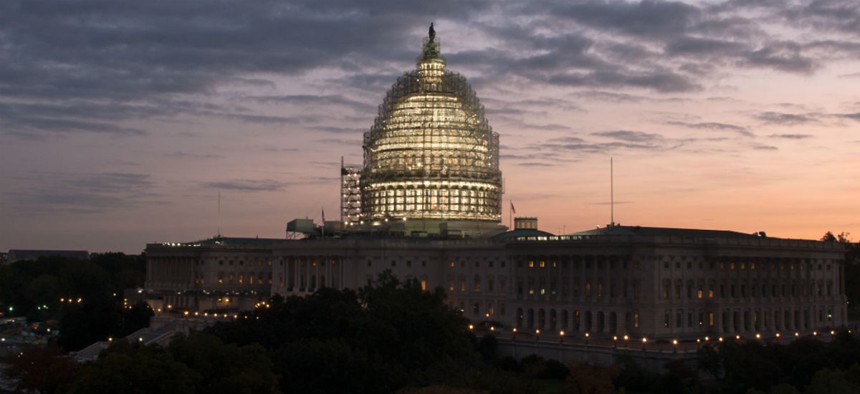
Architect of the Capitol
House Clears Two Bills to Rein in Regulators
White House threatens veto of plans to force agencies to perform extra reviews.
The House on Thursday approved two bills that would revamp rulemaking procedures at multiple agencies, largely on party-line votes that drew a veto threat from the White House.
The Searching for and Cutting Regulations that are Unnecessarily Burdensome (SCRUB) Act (H.R. 1155), sponsored by Rep. Jason Smith, R-Mo., would establish a Retrospective Regulatory Review Commission to reexamine the Code of Federal Regulations to identify major rules and sets of rules that collectively implement a regulatory program that should be repealed to lower the cost of regulation. It would assign the commission a goal of achieving a reduction of at least 15 percent in the cumulative costs of regulation with a minimal reduction in the overall effectiveness of such regulation.
“175,268 pages of federal regulations are stifling economic growth and opportunity in this country,” Smith said after the vote. “The SCRUB Act sets up a process to finally review and get off the books and out of the way many of these outdated, burdensome, duplicative and unnecessary regulations. The American people have had enough of this White House circumventing Congress to try to push through its failed policy attempts with new regulatory and rule making.”
The bill passed 245-174, after it was championed by House Speaker Paul Ryan, R-Wis., and Oversight and Government Reform Committee Chairman Jason Chaffetz, R-Utah.
Opposition came from Oversight ranking member Rep. Elijah Cummings, D-Md., who said, “This bill attempts to reduce bureaucracy by creating a new commission that would cost taxpayers $30 million to do what agencies and Congress are already doing.” The newly created panel “would have virtually unlimited authority to subpoena witnesses or documents,” he added. “This means that it could compel an individual to testify on any subject. A schoolteacher could be compelled to testify about education rules, or a senior citizen could be compelled to testify about Medicare or Social Security rules.”
In its veto threat, the White House emphasized the ongoing review of regulations it has been conducting since 2011. “Although outside input and perspective on what rules may be ripe for potential reform or repeal is crucial, retrospective review is most effective when led by the agencies,” the Obama administration’s statement said.
“The bill's creation of a stand‑alone commission to review the entire Code of Federal Regulations is likely to produce a haphazard list of rules that, under the procedures in the bill, must be repealed if approved by a joint resolution. There appears to be no mechanism for making thoughtful and modest modifications to rules to improve their implementation and enforcement, which is often the best course of action for making regulations work better.” Overall, the administration said, the bill would “interfere with the ability of agencies to issue regulations that are essential for the protection of public health, safety and the environment.”
Also approved was the Sunshine for Regulatory Decrees and Settlements Act (H.R. 712), sponsored by Rep. Doug Collins, R-Ga., which would crack down on agency use of consent decree or settlement agreements with private parties affected by regulations. Agencies, under supervision by the Justice Department, would be required to publish plans for such proposed settlements for public comment and report frequency of their use to Congress.
It passed 244-173.
“Closed-door deals, known as ‘Sue and Settle’ cases, are arrangements between pro-regulatory special interest groups and complicit federal agencies,” Collins said after the vote. “Often, there is no participation by affected parties like states and local governments, small businesses, or farmers – everyday Americans just trying to make a living or go about their daily business. Special interest groups exploit the legal system to skirt the normal rulemaking process, and public comment and transparency are largely absent. Affected parties forced to comply with these regulations are often kept completely in the dark about the new rules, the details of which can come as a complete surprise.”
In rebuttal, Rep. Jared Polis, D-Colo., said the two bills would make the American people less safe, while “preventing agencies from doing their jobs” in part because staff would be forced to respond to 100,000 public comments.
In its statement of administration policy, the White House said the sue and settle bill “would require numerous, cumbersome layers of reporting from federal agencies. It also would address a nonexistent problem that is already prohibited by federal regulations: collusion between agencies, interest groups, and the courts to avoid compliance with the rulemaking procedures described above. H.R. 712 accordingly would serve only to introduce redundant processes for litigation settlements and spawn excessive, expensive and time-consuming regulatory litigation.”
The House-passed bills were generally backed by major business groups and opposed by consumer, labor and environmental group coalitions.
A Senate version of the SCRUB Act (S. 1683) was introduced by Sen. Orrin Hatch, R-Utah, in June, and a Senate version of the settlements bill (S. 378) was introduced by Sen. Chuck Grassley, R-Iowa, in February. Both are pending in committee.
Other Senate regulatory reform bills are also proceeding, with some bipartisan support.







